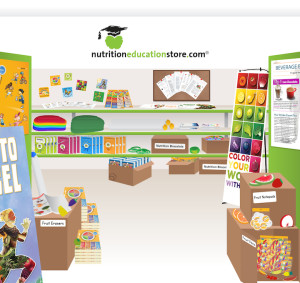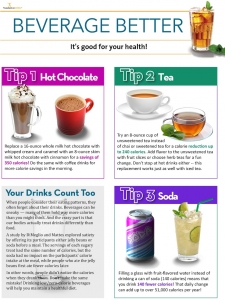If you open up almost any refrigerator, you’re likely to find some eggs. But how old are they?
If you’re like most people, eggs can hang out in your refrigerator for a while. At what point are they unsafe to eat?
Food safety specialists and the folks at the American Egg Board assert that eggs can keep in the refrigerator at below 40 degrees for 4-6 weeks after purchase.
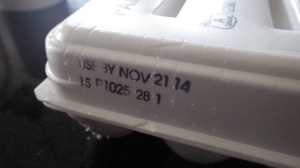 So what does the code on the carton mean?
So what does the code on the carton mean?
The code on the carton is a “Julian date” and it’s the date the egg was packed into the carton.
Let’s look at an example. I recently found a package of eggs in my refrigerator that had the code of 281. Checking the “Julian date” calculator on the web, I learned that that the egg was packed on the 281st day of the year — that’s October 8. The use-by date is November 21, which is 45 days after the “Julian date.” That’s right on target at 5 weeks.
Okay, so now that we’ve talked about when eggs are good, let’s review how to keep them in the best shape. I’m talking about storing them — should you put eggs in the door or the carton?
The general consensus these days is to keep eggs in their carton and put the carton in the coldest part of the refrigerator. Skip those little shelves on refrigerator doors. With the door opening and closing throughout the day, the eggs stored in the door are subjected to temperature changes, which can cause quality loss. Storing the eggs in the original carton also helps eggs keep their moisture.
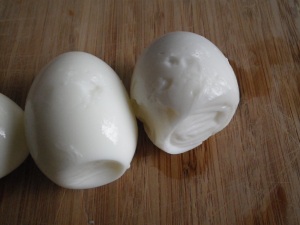 But what if you don’t have the carton? How well can you tell the age of your eggs?
But what if you don’t have the carton? How well can you tell the age of your eggs?
For many years, I believed that the age of an egg could be estimated by the size of the air cell inside. The theory was that an egg evaporates as it ages. Since the shells are porous, moisture and carbon dioxide escape and air enters the shell. This makes the air cell larger, and with more air inside, the egg floats. That’s a good theory… but, it’s not always reliable.*
According to a representative of the American Egg Board, just because an egg floats does not necessarily mean that it’s old. Instead, it may just be that the chicken laid the egg with a large air cell in the first place.
Therefore, you can’t always tell the age of an egg by putting it in a bowl of water.
On the other hand, evaporation is the premise used in the recommendation for using a “slightly older” (7-10 days) egg for hard-cooking. An egg that’s a bit older allows for easier peeling. As the egg ages, it “looses” the egg membrane’s connection to the shell, which in turn makes it easier to peel.
So, to tell the age of an egg, we need to look at what else happens when an egg ages.
When cracked open, an older egg will appear flatter. It will spread out more and the yolk membrane will be weaker and easier to break. These eggs won’t look as good when served sunny-side up, but when the appearance isn’t important, they’ll still work fine.
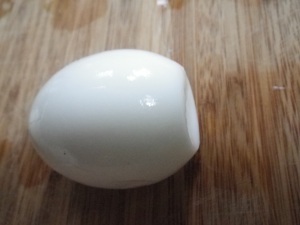 An “older egg” (I’m talking about eggs that are near that 45-day “use by” date) may also not look great for when it comes to hard-cooking eggs because that air cell is more prominent. See the photos here — those are oddly-shaped hard-cooked eggs.
An “older egg” (I’m talking about eggs that are near that 45-day “use by” date) may also not look great for when it comes to hard-cooking eggs because that air cell is more prominent. See the photos here — those are oddly-shaped hard-cooked eggs.
According to the American Egg Board, a properly-handled egg rarely spoils or becomes unsafe if it’s stored properly, no matter how long it is kept.
That said, as an egg ages, it dries out and the quality diminishes. The American Egg Board recommends throwing out eggs after 4-6 weeks.
You’ll know right away if an egg has spoiled because it will have a very unpleasant sulfur stench. Once you open the shell, you will be able to smell it. This is pretty rare, but very memorable.
So there you have it. A guide to the age of eggs.
By Cheryle Jones Syracuse, MS, Professor Emeritus at The Ohio State University
*Note: The Egghead Quiz has been changed to reflect this new information.
Have you seen the latest and greatest from the Nutrition Education Store? There are over 70 TOTALLY-NEW materials for you to try. For great shopping resources like the post above, try…
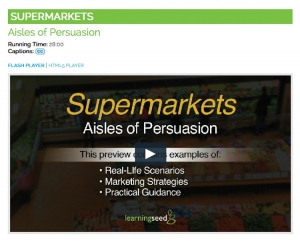
Supermarket Shopping DVD
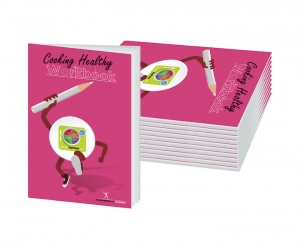
Healthy Cooking and Shopping Workbook
PLUS there are wonderful new designs in the Displays by Design category. These resources will help you coordinate displays at health fairs or job sites. There are lots of great banners, stickers, posters, handouts, and bulletin board kits in each display, all of which will make your job a snap!
